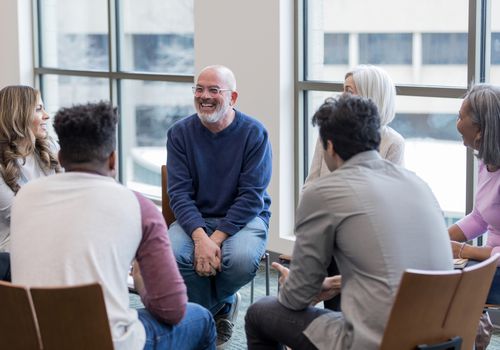If you are living with OCD, it can be difficult to manage your symptoms on your own. This is where OCD support groups can be a huge help. There are many different groups available, each with its own strengths and weaknesses. How do you find the right one for you? In this blog post, we will discuss what exactly an OCD support groups mean and how to find the right OCD support group for you.
Contents
What Does OCD Support Group Mean?
 OCD support groups are organized meetings for people who suffer from OCD. They provide a space for sufferers to openly share their experiences. And feelings with others who understand what they are going through.
OCD support groups are organized meetings for people who suffer from OCD. They provide a space for sufferers to openly share their experiences. And feelings with others who understand what they are going through.
This is often referred to as “peer support.” Moreover, these groups can provide education about OCD. They also offer a space to practice coping skills with people who will not judge you. An OCD support group can be a powerful tool in your recovery journey.
There are many different types of OCD support groups. These include;
- Meet in person,
- Others meet online.
- Some are led by mental health professionals.
- Others are run by people who live with OCD themselves.
There is no “right” type of group. The important thing is to find one that feels comfortable for you. Support groups can be an immensely valuable resource for people with OCD. They provide a space to openly share experiences.
How Do OCD Support Groups Work?
An OCD support group is a place where people with OCD can come together to share their experiences and support one another. The groups are usually facilitated by a mental health professional, and they provide a safe and confidential space for people to discuss their symptoms, triggers, and coping strategies.
More often than not, people with OCD feel isolated and alone in their struggle. Support groups can be an invaluable resource for finding understanding and hope.
There are several benefits of joining an OCD support group, some of these include;
- Getting to know that you are not alone in your struggle with OCD
- Learning about other people’s experiences with OCD and how they coped with it.
- Sharing your own experiences with OCD and receiving support from others who understand what you’re going through.
- Feeling less isolated and more hopeful about overcoming OCD.
If you or someone you know is struggling with OCD, consider finding an OCD support group in your area. It can be way more helpful than you might think. In fact, it might just be the support you need to finally start feeling better.
What To Consider While Finding Support Groups?
 When you are looking for support groups, there are a few things you should consider. Some of these include;
When you are looking for support groups, there are a few things you should consider. Some of these include;
The first is whether the group is truly dedicated to helping those with OCD. There are many groups out there that claim to be for people with OCD, but in reality, they are not. They may be nothing more than social clubs or support groups for other disorders. If the group is not specifically for people with OCD, it is probably not going to be very helpful to you.
The second thing you should consider is how large the group is. Some groups have only a handful of members while others have hundreds. The size of the group can make a big difference in how effective it is. A larger group can provide more support and resources, but a smaller group may be more intimate and easier to get to know the other members.
The third thing you should consider is whether the group meets in person or online. There are advantages and disadvantages to both. Meeting in person can be more helpful because you can get support from the other members in person, but it can also be more difficult to find a group that meets in your area. Online groups can be easier to find and you can participate from the comfort of your own home, but you may not have the same level of interaction with the other members.
Finally, you should consider what type of support the group offers. Some groups offer only emotional support while others also offer educational resources and information about OCD. The type of support offered by a group can make a big difference in how helpful it is to you.
If you keep these things in mind, you should be able to find a support group that is right for you.
How To Find The Right OCD Support Groups?
Support groups are often very helpful for people with OCD. They provide a place to share stories and advice, and they can help you feel less alone. But not all support groups are created equal.
Here are some things that can help you to find the right OCD support groups;
Do Some Research
It is the prominent tip that anybody will give you. When you are looking for something as important as a support group, it is crucial to do your research. The best way to find out which OCD support groups are available in your area is by using the internet or speaking to your GP.
Moreover, the most suitable option would be to look for an OCD support group that is run by a professional organization. This way, you can be sure that the group will be well-structured and run by people who are knowledgeable about OCD.
Additionally, research can also help you to find out whether there are any specific support groups for your type of OCD. For example, there are many groups that focus on particular subtypes of OCD, such as contamination or relationship obsessions.
Think About What You Need
When you are looking for an OCD support group, it is important to think about what you need from the group. Some people prefer a small and intimate setting, while others feel more comfortable in a large group. There are also some people who prefer to meet online, while others prefer to meet in person.
It is also important to think about what kind of support you are looking for. Some people want a group that focuses on education and information, while others want a group that is more focused on emotional support.
Consider Your Commitment Level
Before you join an OCD support group, it is important to consider your commitment level. Some groups require weekly or monthly meetings, while others only meet occasionally. There are also some groups that require members to participate in online forums or chat rooms.
If you are not sure whether you will be able to commit to a particular group, it is best to speak to the leader of the group before you join. This way, you can find out more about the group and what is expected of members.
Don’t Be afraid to Try Multiple Groups
 If you find that the first OCD support group you try isn’t a good fit, don’t be afraid to try another one. It can take some time to find the right group for you, but it will be worth it in the end. There are many different groups out there, so there is sure to be one that is perfect for you.
If you find that the first OCD support group you try isn’t a good fit, don’t be afraid to try another one. It can take some time to find the right group for you, but it will be worth it in the end. There are many different groups out there, so there is sure to be one that is perfect for you.
Because there are times when you will feel like giving up on your treatment, it is important to have a support system in place. Support groups can provide you with the emotional and educational support that you need to stay on track. By following these tips, you can be sure to find the right OCD support group for you.
Ask For Recommendations
If you know somebody who attends an OCD support group, ask them for a recommendation. This can be a great way of finding out about different groups and what they offer. In fact, many people find that they have more success with a group that has been recommended to them by somebody they know.
Therefore, these are some of the things that can help you to find the right OCD support groups. Remember, it is important to do your research and to think about what you need from a group. Additionally, don’t be afraid to try multiple groups until you find one that is a good fit for you.
What Things You Should Care About?
When you first join an OCD support group, you might feel a bit nervous or apprehensive. This is perfectly normal! It can be scary to open up about your experiences with OCD but remember that everyone in the group is there for the same reason: to find support and understanding. The atmosphere of an OCD support group should be one of acceptance, respect, and non-judgment.
Here are a few things you should take care of after joining a support group;
Be respectful of other people’s experiences
Everyone’s experience with OCD is unique, and no one story is more important than another. As OCD is often a very personal topic, it is important to be respectful of the experiences that others share. In fact, if you are respectful of other people’s experiences, they will likely be more open to hearing about your own.
Be mindful of the language you use
The words we use to describe our experience with OCD can have a big impact on how we feel about ourselves. It is important to be mindful of the language you use when talking about your OCD. For example, instead of saying “I am my OCD,” try saying “I have OCD.” This small change can make a big difference in how you view yourself and your relationship with OCD.
Listen more than you speak
It can be tempting to want to share your story as soon as you join a support group. And while it is important to share your experiences, it is also important to listen to the experiences of others. Listening to others can help you feel less alone in your experience and can also give you new perspectives on how to cope with OCD.
Find a group that feels right for you
 There is no one-size-fits-all when it comes to supporting groups. Some people find large groups helpful while others prefer smaller, more intimate groups. And some people find online groups to be helpful while others prefer in-person groups. The important thing is to find a group that feels right for you. If a group doesn’t feel like the right fit, don’t be afraid to try another one! There are many different OCD support groups out there, so there is sure to be one that is a good fit for you.
There is no one-size-fits-all when it comes to supporting groups. Some people find large groups helpful while others prefer smaller, more intimate groups. And some people find online groups to be helpful while others prefer in-person groups. The important thing is to find a group that feels right for you. If a group doesn’t feel like the right fit, don’t be afraid to try another one! There are many different OCD support groups out there, so there is sure to be one that is a good fit for you.
So, these are some of the things you should care about after joining an OCD support group. Just remember that the most important thing is to find a group that feels right for you. And if one group doesn’t work out, don’t give up! There are many different groups out there, so there is sure to be one that is a good fit for you.
Conclusion
Conclusively, OCD support groups are important because they provide a sense of community for people with OCD. They can also offer helpful resources and information about the disorder. If you are considering attending a support group, it is important to do your research to find one that feels right for you.
Moreover, if you are not comfortable attending a support group in person, there are many online options available. But before that, you should read about the different types of OCD support groups and find one that will work for you. OCD support groups can be a great way to meet other people with OCD and learn more about the disorder.
If you are looking for affordable Online OCD Counseling MantraCare can help: Book a trial OCD therapy session


